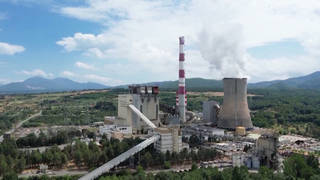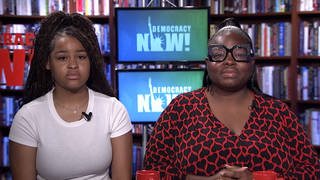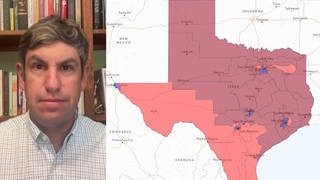
Topics
Guests
- Zorka Milinsenior legal adviser with Global Witness. The organization works to improve transparency and accountability in the extraction of natural resources.
Since 1998, more than 5 million people have died in the Democratic Republic of Congo in what has been described as the deadliest documented conflict in African history. Much of the fighting has been over precious minerals including tantalum, tin, tungsten and gold. Tantalum has become a precious commodity in the digital age — it’s found in cellphones, DVD players, laptops and hard drives. Human rights groups have long pushed for mandatory labeling of so-called “conflict minerals” in order to allow consumers and investors to avoid fueling the bloody conflict through the purchase of their products. The mandatory disclosure policy became law as part of the 2010 Dodd-Frank Wall Street Reform Act. But this week a federal appeals court ruled the Securities and Exchange Commission cannot force companies to disclose whether minerals come from the Democratic Republic of Congo because the mandatory labeling would violate the companies’ freedom of speech. We speak to Zorka Milin, senior legal adviser with Global Witness.
Transcript
JUAN GONZÁLEZ: Since 1998, more than 5 million people have died in the Democratic Republic of Congo in what has been described as the deadliest documented conflict in African history. Much of the fighting has been over precious minerals, including tantalum, tin, tungsten and gold. Tantalum has become a precious commodity in the digital age—it’s found in cellphones, DVD players, laptops and hard drives.
Human rights groups have long pushed for mandatory labeling of so-called conflict minerals in order to allow consumers and investors to avoid fueling the bloody conflict through the purchase of their products. The mandatory disclosure policy became law as part of the 2010 Dodd-Frank Wall Street Reform Act.
AMY GOODMAN: But this week, a federal appeals court has ruled the Securities and Exchange Commission cannot force companies to disclose whether minerals come from the Democratic Republic of Congo because the mandatory labeling would violate the companies’ freedom of speech.
For more, we go directly to Washington, D.C., where we’re joined by Zorka Milin, a senior legal adviser with Global Witness. The group works to improve transparency and accountability in extraction of natural resources.
Welcome to Democracy Now! Why don’t you start off, Zorka, by talking about what the judge has ruled and what exactly are the minerals you’re talking about?
ZORKA MILIN: Thank you, Amy. It’s great to be here on the show. And it’s very fitting, because what’s really at stake in this decision is democracy and transparency. And what we have is renegade judges who have turned the First Amendment on its head and allowed corporations to use it as a deregulatory tool. The decision from this week has sweeping implications for all kinds of important consumer disclosures, ranging from nutrition labeling on foods, country-of-origin labeling, health and safety warnings in products. So it is certainly a very momentous decision and is a continuation and intensification of this trend that we have seen, including with Citizens United, of corporations kind of weaponizing the First Amendment—a provision which was really intended to protect the free speech rights of citizens, of individual citizens, and not corporations.
JUAN GONZÁLEZ: Well, what specifically was the provision of the Dodd-Frank Act that was at question here? And could you give a little bit more detail on that?
ZORKA MILIN: Sure. The provision is much broader than the phrase that was challenged here, which is just the use of the phrase, “not found to be conflict-free,” which the companies did not want to use in their disclosures. And to be clear, it’s not an issue of labeling on a product; it’s a phrase that appears in a filing that’s made with the Securities and Exchange Commission.
The companies did not object to the rest of the law, which really is much broader. And the heart of that law requires companies to engage in due diligence to ensure that their supply chains and the minerals that they’re purchasing are not funding the terrible conflict in the Democratic Republic of Congo. So the rest of the law still stands, and companies still have to perform those kinds of due-diligence measures.
The phrase, “not found to be conflict-free,” was intended to be a spur to companies to ensure that they
have the right processes in place. And it’s really shameful that rather than focusing their energies on that, companies have instead chosen to bring dubious constitutional challenges.
AMY GOODMAN: So, can you name a company and tell us exactly what’s happening in the Democratic Republic of Congo, why you want conflict minerals to be identified?
ZORKA MILIN: Well, it’s an interesting question: Can we name these companies? You know, the lawsuit itself was brought by a group of business lobby associations that include the U.S. Chamber of Commerce, the National Association of Manufacturers and the Business Roundtable. So, effectively, individual companies are hiding behind these powerful business lobbying groups, and so it makes it difficult to really kind of name and shame individual companies that have been challenging this law. This is, unfortunately, a broader trend that’s not limited to this case, and is something that we see in other cases where business groups are challenging regulations that they don’t like.
When it comes to what we see on the ground, of course, it’s a very complicated conflict, and minerals are one of the factors, certainly a significant contributing factor, to the conflict. But there are numerous other complications with different armed groups and different actors. So it’s really difficult to kind of oversimplify the situation. That said, we firmly believe that this law can contribute to positive change on the ground.
JUAN GONZÁLEZ: Now, this was a decision in the D.C. Circuit Court of Appeals, which is known as a very pro-business, conservative circuit of the federal judiciary. What’s the next step here?
ZORKA MILIN: Well, we don’t think that the decision can stand, and we think that the SEC will agree with us. The SEC was the defendant in this case, and so it is up to them to bring further appeals and to make sure that this incredible, misguided and damaging decision is overturned. And we certainly expect to see that, because the sweeping implications that I was describing earlier apply, perhaps especially, to the kinds of disclosures that the—the stock exchange disclosures that the Securities and Exchange Commission routinely requires from its issuers. So, we very much hope and expect to see further review and, you know, this terrible decision to be overturned.
AMY GOODMAN: Zorka, we have less than a minute, but with people increasingly walking around with smartphones, are conflict minerals a growing problem?
ZORKA MILIN: Well, I think that conflict minerals are not a necessary component of the electronics products that we all use. And it is possible to source minerals responsibly, including from the Democratic Republic of Congo. An analysis that our group did of some of the first filings under this law, which were made last year, shows that about 20 percent of companies have complied with the law fully, and so that shows that it’s possible. And we certainly hope that more and more companies will engage with the law in a more positive way and contribute to a responsible sourcing of minerals in the Congo for mines which are not controlled by the armed groups.
AMY GOODMAN: Zorka Milin, we want to thank you for being with us, senior legal adviser with Global Witness, a group that’s working to improve transparency and accountability in the extraction of natural resources.












Media Options